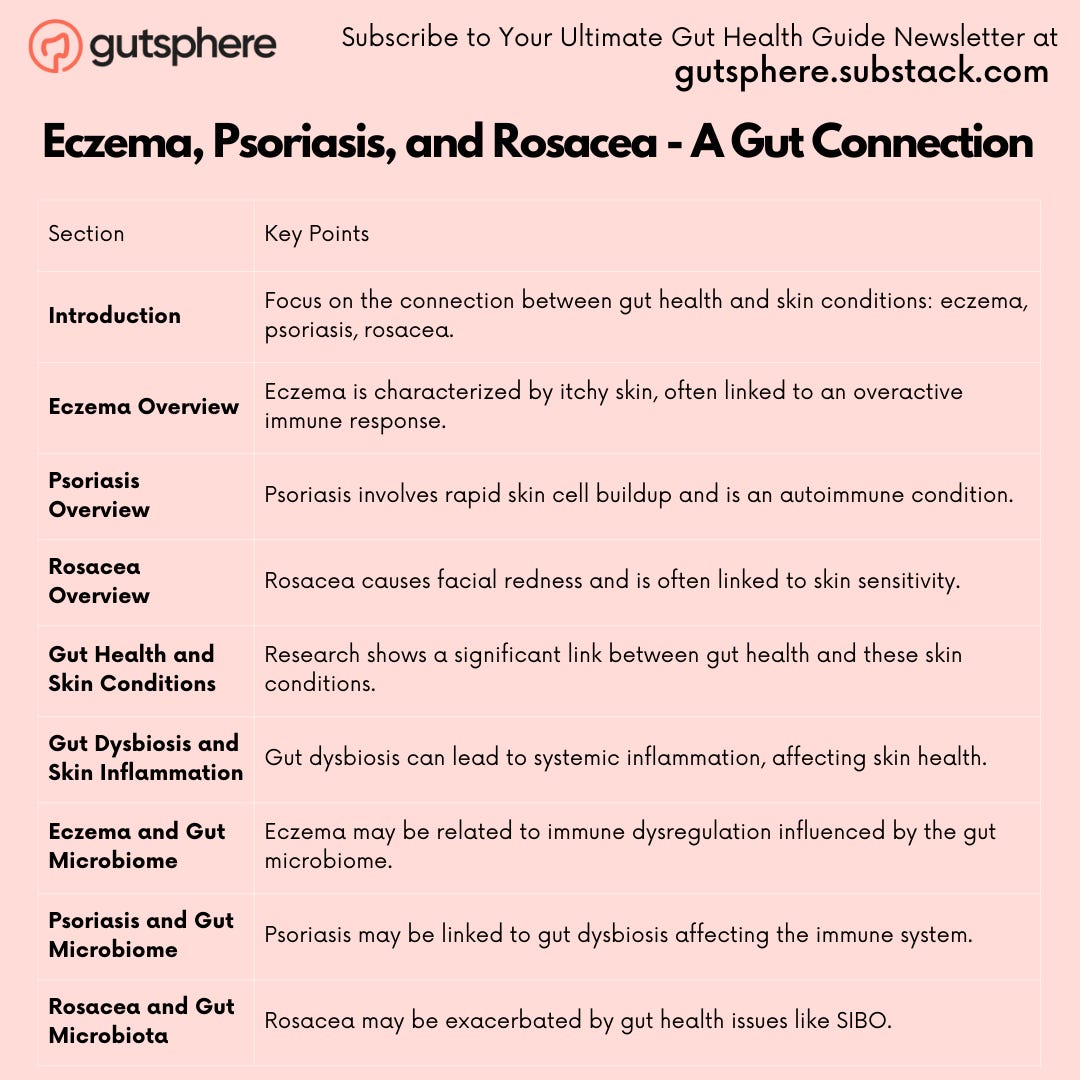Skin Inflammation and the Gut: Finding Balance
Eczema, Psoriasis, and Rosacea - A Gut Connection
Introduction to the Complex Relationship Between Gut Health and Skin Conditions
Welcome to Part 4 of our 'Gut to Skin' series, titled "Skin Inflammation and the Gut: Finding Balance." In this segment, we focus on understanding the intricate connection between gut health and common inflammatory skin conditions: eczema, psoriasis, and rosacea.
Understanding Eczema, Psoriasis, and Rosacea
Eczema (Atopic Dermatitis): A condition characterized by dry, itchy skin and rashes. While the exact cause is unknown, eczema is believed to be driven by an overactive immune response and is often linked to other allergic conditions.
Psoriasis: A chronic autoimmune condition that results in the rapid buildup of skin cells, leading to scaling on the skin’s surface. Inflammation is a key component of psoriasis.
Rosacea: A chronic skin condition that causes redness and visible blood vessels in the face. It may also produce small, red, pus-filled bumps and is often associated with skin sensitivity.
The Role of Gut Health in These Skin Conditions Emerging research indicates a significant link between the health of our gut and the occurrence and severity of these skin conditions. Imbalances in the gut microbiome, known as dysbiosis, can lead to systemic inflammation, which plays a crucial role in the development and exacerbation of eczema, psoriasis, and rosacea.
Gut Dysbiosis and Skin Inflammation
Gut-Skin Axis: This term refers to the bidirectional relationship between the gut and the skin. The gut microbiome influences systemic immune responses, which can manifest in the skin.
Inflammation: Inflammatory processes in the gut can exacerbate skin inflammation. An imbalance in the gut microbiome can trigger inflammatory cytokines, which can worsen skin conditions.
Delving Deeper into Eczema and Its Connection with Gut Health
In this section, we focus specifically on eczema and how gut health plays a pivotal role in its manifestation and management.
Eczema and the Gut Microbiome:
Immune Dysregulation: Eczema is often associated with immune system dysregulation. The gut microbiome is instrumental in immune system development and function, meaning that imbalances in gut bacteria can directly impact immune responses, leading to skin inflammation.
Leaky Gut Syndrome: A condition where the intestinal barrier becomes permeable, allowing bacteria and toxins to enter the bloodstream. This can trigger an immune response, manifesting as skin inflammation seen in eczema.
Psoriasis: Uncovering the Gut-Skin Link
Autoimmune Component: Psoriasis is driven by an autoimmune response where the body mistakenly attacks its own skin cells. The gut microbiome plays a role in modulating the immune system, and dysbiosis has been linked to autoimmune conditions, including psoriasis.
Inflammatory Cytokines: An imbalanced gut microbiome can lead to increased production of inflammatory cytokines, exacerbating the skin inflammation characteristic of psoriasis.
Rosacea and Gut Microbiota:
Skin Barrier Function: Rosacea can be exacerbated by compromised skin barrier function, which may be influenced by gut health. A healthy gut microbiome is essential for maintaining the integrity of both the gut and skin barriers.
Small Intestinal Bacterial Overgrowth (SIBO): Studies have shown a higher prevalence of SIBO in individuals with rosacea, suggesting a direct gut-skin connection.
Conclusion:
The journey through "Skin Inflammation and the Gut: Finding Balance" highlights the significant role of gut health in managing inflammatory skin conditions like eczema, psoriasis, and rosacea.
Next
Part 5: Hydration and Immunity: The Gut-Skin Link
Request
Share
Our sincere request to you is to share the newsletter with your friends, family, and community so that they can benefit from the content. Also it will help us grow the newsletter, and eventually, as we release more content, digital tools, and more we will enable people around the world to live chronic disease free.
Subscribe
Feedback
Also, please give us feedback so that we can improve the content. And if there are any topics that you want us to cover please send us your questions and topics. Furthermore, if you try any of the things we provided information please share your experience with us.
Thank You
GutSphere Team
Disclaimer
Please note that the information provided in this newsletter is for informational purposes only and should not be considered as a substitute for professional medical advice, diagnosis, or treatment. If you have any concerns or questions about our health, please consult with a licensed healthcare professional. The information contained in this newsletter is not intended to diagnose, treat, cure, or prevent any disease. The publisher and authors of this newsletter assume no responsibility for any adverse effects that may result from the use of the information contained herein.



